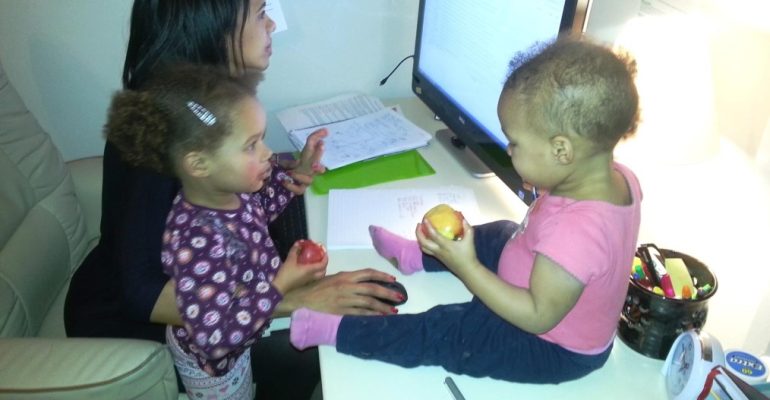From Sacrifice to Equity: Inclusive Leadership & Carers

From Sacrifice to Equity: Inclusive Leadership & Carers
I just stumbled upon this apt picture of me and my two wonderful daughters at my desk, taken over a decade ago during the early stages of my consultancy. It reminded me of the challenging choices we often have to make as parents/carers, both as business owners and employees, due to the lack of inclusion in our organisations.
Recent research data shows that:
- 59% of unpaid carers are women (Census 2021). Women are more likely to become carers and to provide more hours of unpaid care than men.
- More women than men provide high intensity care at ages when they would expect to be in paid work (Petrillo and Bennett, 2022).
- Black, Asian and ethnic minority carers are more likely to be struggling financially. At the beginning of the pandemic, over half (58%) of unpaid carers from Black, Asian and minority ethnic groups said they were worried about their finances, compared to 37% of White carers (Carers UK, The Experiences of Black, Asian and minority ethnic carers during the COVID-19 pandemic, 2022).
- LGBT carers are more likely to feel lonely. 48% of bisexual carers and 45% of lesbian and gay carers often or always feel lonely, compared with 33% of heterosexual carers (Carers UK, The Experiences of lesbian, gay and bisexual carers during the COVID-19 pandemic, 2022).
Many of us have encountered and had to turn down numerous opportunities that could have fast-tracked our career/business growth. Why? Because the world around us isn’t always inclusive, and the responsibilities of caring for our loved ones often leave us with tough decisions to make – often without fair options and support.
And yes, women still bear the brunt of caring responsibilities, facing societal expectations and biases that affect their career trajectories. This gender disparity has a significant impact on both professional and personal lives.
One of my “ouch” mama moments happened as I was queuing for a much-needed coffee at my company café shortly after I reluctantly went back to the office after my maternity leave. A colleague welcomed me back and asked what I was doing with my daughter whilst I was back at work. I remember saying that I had dropped her off to nursery before work, then would pick her up on my way home.
His response? “Wow, that means she spends more time at work than you!” I still can’t decide if that was banter or a criticism. Regardless, I can still feel the crushing impact it had on me!
So, here’s my invitation to you this Carers Week – pay closer attention to who is around you. Check in on the experiences and needs of your diverse people. Commit to challenging traditional norms, breaking down barriers, and fostering an inclusive environment that supports all carers, regardless of gender.
Leaders and decision-makers, some questions:
- How aware are you of the limitations that your systems and processes (e.g. recruitment, access, flexibility, progression) might place on those with caring responsibilities within your organisation?
- Do you have enough representation of carers in your leadership team? Are your expectations/criteria for progression fair and realistic for ALL?
If not, is that another unspoken rule about who makes it to the top within your organisation? - As leaders, it is our responsibility to champion equity and create opportunities for all. By promoting flexible work arrangements, implementing supportive policies, and providing resources for carers, we can create an environment that allows EVERYONE to thrive professionally while fulfilling their caregiving responsibilities.
- And to all the carers out there, know that your efforts and sacrifices are invaluable. Remember to prioritise self-care, seek support networks, and advocate for your own needs.
- Together, we can challenge societal norms, drive change, and pave the way for a more inclusive future.












